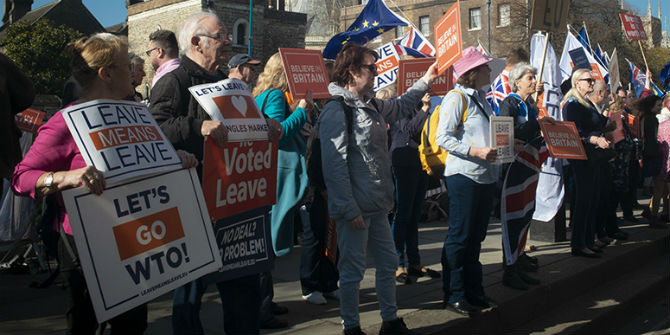 Labour rights are now a basic component of many of the kinds of trade agreements the UK wants to sign post-Brexit, but there has been little discussion of what sort of provisions the UK wants to see in them. James Harrison and colleagues have found that commitments to workers’ rights on paper are not always enforced. They suggest what a labour rights agenda might look like as the UK prepares to leave the EU’s trade deals.
Labour rights are now a basic component of many of the kinds of trade agreements the UK wants to sign post-Brexit, but there has been little discussion of what sort of provisions the UK wants to see in them. James Harrison and colleagues have found that commitments to workers’ rights on paper are not always enforced. They suggest what a labour rights agenda might look like as the UK prepares to leave the EU’s trade deals.
As the Queen’s speech on 21 June set out, the UK government has embarked on a Brexit negotiating strategy which involves leaving the EU’s Single Market and Customs Union, and negotiating its own trade deals with the EU and other states around the world.
There has been considerable discussion about the complexities of such trade deals. What tariff barriers will UK goods face on export? Will divergence from the EU in terms of product and process standards lead to more trade friction? How will rules of origin requirements affect the organisation of cross-border supply chains? And so on. But one area of future UK trade policy that has yet to be discussed in any detail are provisions that address the rights of workers in the UK and its trading partners. This is surprising, not least because labour standards provisions are now included as a basic component of all EU and US trade agreements. As many as 107 countries around the world are now signatories to at least one trade agreement that references labour rights.
In EU trade agreements, to which the UK has of course been party, labour standards provisions have been an important part of the response to increased public concern about, and parliamentary scrutiny of, international trade. Within EU strategy documents, labour provisions are depicted as a critical mechanism for ensuring that trade is ‘not just about interests but also about values’. They are also central to the idea that the European Commission is promoting ‘sustainable economic, social and environmental conditions’ in the EU and trade partner countries.

There should be similar levels of scrutiny and concern about the UK’s evolving trade policy. Across the political spectrum, there is a seeming consensus that one of the lessons of Brexit is that the country needs an economy that ‘works for everyone’ and is run ‘for the many and not just the few’. But there have also been calls for the UK to cut ‘red tape’ related to EU directives on labour legislation and embark on a ‘Global Britain’ trade strategy that prioritises commercial interests above all others. What role could labour standards provisions within the UK’s bilateral trade agreements play in navigating this tension?
A good place to start is with existing practice. Over the last three years we have been examining labour provisions in EU free trade agreements and visiting some of the EU’s trade partners to interview key stakeholders and find out what the actual impact of such provisions has been. What we have found is not encouraging. Commitments on paper are not, for the most part, translating into real effects within the legislative agendas or implementation efforts of trade partners. Other researchers have found that labour provisions in US trade agreements show more promise, but are still not always enforced to the degree they should be.
The deficiencies in existing approaches have led us to start asking questions about the kind of labour provisions that could appear in future UK trade agreements with the EU and other trading partners instead. What should a labour rights agenda look like in UK trade policy? What should it aim to achieve? And what might be its inherent limitations?
There are many ways in which a ‘trade-labour’ linkage could be made in UK trade agreements. For instance, an EU-UK trade deal could be used to reinforce the UK government’s stated commitment to uphold the rights of UK workers as currently protected under EU law. Second, future UK trade agreements with the EU and other partners could look to address the worst forms of exploitation faced in each economy. In the UK, that might mean a focus on precarious work or the abuses suffered by migrant workers. Third, UK trade policy could seek to address labour issues in global supply chains by placing binding responsibilities on corporations; steps which have started to be taken in the UK’s Modern Slavery Act and the EU’s Conflict Minerals Regulation among other initiatives. And more expansively, UK trade agreements could be negotiated with a view to helping workers and those in labour movement better advance their own rights at work.
Our starting point is to unpack what the aims and objectives of labour provisions might be, and then to work out to what extent, and by what means, they can (or cannot) be fulfilled. As a starting point for the more detailed debates to come, we have identified three principles – ‘protect, promote, empower’ – to guide this endeavour. On 4 July, at the British Library in London, we will be discussing our ideas alongside Rosa Crawford from the TUC and Paul Keenlyside from the Trade Justice Movement. We invite you to join us by registering here and look forward to hearing your thoughts on how to craft trade policy that really ‘works for everyone’,
This post represents the views of the authors and not those of the Brexit blog, nor the LSE.
Dr James Harrison is Reader in the School of Law at the University of Warwick.
Dr Ben Richardson is Associate Professor in International Political Economy in the Department of Politics and International Studies at the University of Warwick.
Dr Liam Campling is Senior Lecturer in Political Economy in the School of Business and Management at the Queen Mary University of London.
Adrian Smith is Professor of Human Geography in the School of Geography at the Queen Mary University of London.
Dr Mirela Barbu is a Postdoctoral Research Associate in the School of Geography at the Queen Mary University of London.







1 Comments